In today’s post, I will show how to do meditation for beginners at home.
If you are a beginner in meditation, the next analogy will help you understand the basic idea behind it.
Think of the following situation:
What happens when your cup is full, but you keep adding more coffee?
The coffee starts to overflow the cup, right?
Your cup doesn’t have the capacity to collect as much coffee.
And after trying a few times, you realize that it is impossible to add more.
The same happens to your mind.
Every day you add more and more to it, but you never empty it.
Worries, fears, judgments, memories, and/or regrets are the kind of content you give your mind on a daily basis.
Until the time comes when your mind cannot receive more.
At that point, the load is so big that your mind begins to malfunction.
This post on how to do meditation for beginners is ideal for you if:
– You feel mentally exhausted due to negative thought patterns that do not go away.
– You are always living in the past or in the future, RARELY focused on the Now.
– You spend more time regretting the past and worrying about the future than enjoying the present moment.
– You live in loops of crazy thoughts that you can’t stop thinking about.
-You tried meditation techniques in the past without having any results.
– You feel stressed, depressed, or anxious most of the time.
If you are in any of those moments of your life, I have good news!
Below, you will find how to do meditation for beginners, like you, all at home.
What benefits do you get when you do meditation as a beginner?
People have used meditation for years for different reasons.
Meditation impacts the health of your brain, but also the rest of your body.
During each session, your body and mind enter a different state.
That state makes you more aware of the present.
The only thing that matters is you!
Many cultures use meditation as medicine to cure illnesses.
It is also used to prevent diseases.
Meditation reduces stress levels and increases blood circulation in your body.
Even if you are a beginner, from the first few weeks, you will begin to feel some benefits of meditation.
Next, I will show you a list of the benefits that meditation has on your body and mind.
What meditation can do to your body:
- Lower blood pressure.
- Lower your heart rate.
- Lowers cortisol and cholesterol levels.
- Increases blood circulation.
- Prevents heart disease and stroke.
- Strengthens the immune system.
What meditation can do to your mind:
- Reduces anxiety.
- Increase positive conversation.
- Reduces depression.
- Increases relaxation.
- Improves mental performance.
- Strengthens self-control.
- Improve memory.
- Sharpen the focus.
How to do meditation for beginners?
Every day, you have thoughts that wander through your mind without stopping, right?
Well, meditation is a way of training your mind to be aware of those thoughts.
And why should you be aware of them?
Because that way you will be able to absorb them and concentrate on the present.
This may take years of practice, but it is possible.
Keep in mind that there are many meditation techniques that need different skills.
Some techniques are for beginners and others for people with more experience.
This post focuses on techniques for beginners.
Now, you will learn the process of how to start meditation for beginners at home.
Preparation
Depending on whether you live alone or with your family, this can be a little different.
Before meditating, you should find a quiet place at home.
If you live in the middle of the city as I do, that can be a challenge.
In my case, I always have noise coming from the streets through my windows.
This is a somewhat difficult situation to control.
So what I do is I put on the headphones to cancel the noise.
In general, this is what you need to prepare before starting your meditation:
- Peaceful place
- Headphones
- Pillow
- Mat
- Guided meditation audio (see below*)
- Comfortable clothes
- Take care of your personal needs (see below**)
*If you are planning to do meditation, and you are a beginner, I recommend using guided meditations.
Where can you find these meditations?
On YouTube, there are different videos on meditation for beginners.
Or you can use apps like Medito, Calm, or Serenity.
I use Medito every day, and it fits my needs well.
Before deciding on a single application, I had to try them all.
So start identifying what you like and don’t like in meditation.
Some people also like to put a scent in the room to help them relax.
And although this is optional, it can be very helpful.
**Make sure to go to the bathroom, eat or drink water before starting the session.
Cover whatever need you think your body has.
That way, you can concentrate more without worrying.
The most important thing is to make sure that you are not going to get distracted by things like that.
Now, let’s see the technique that works better for beginners when they start to do meditation.
The technique
The easiest way beginners can use to start meditating is concentration.
In the concentration meditation technique, you should focus on only one thing.
It can be your breath, your body, or your environment.
No matter what you choose to focus on, you must commit to keeping your attention there.
During my session, I like to focus on my breath or the sensations in my body.
I am going to share more about these two options below.
The following tips are key if you are a beginner who wants to know how to do meditation.
If you decide to use guided meditation, it is possible that it includes either of these two options.
But if you decide to do it on your own, these tips will help you a lot.
Tip #1 on how to do meditation for beginners at home: Scan your body
This is a common method of training your mind to focus on one thing.
This is what you should do:
During your meditation, you will think about the sensations in your body.
Focus only on your body.
If you get distracted by thoughts, acknowledge them and return to your body.
Here are some questions that can help you during meditation:
- How does your hair feel around your neck or shoulders?
- Do you feel hot or cold?
- Do you feel tickling in your legs or arms?
- Can you feel the pillow or mat under you?
- Does your back hurt or do you feel it is heavy?
- Is your face relaxed?
The key here is to notice any sensations in your body.
At first, it may be difficult to find these sensations.
And the reason is that we are not used to paying attention to them.
But when you do, you will be more aware of all the sensations in your body.
It is an incredible method to hold on to the present.
Throughout the session, your focus will be on your body.
Tip #2 on how to do meditation for beginners at home: Your breath.
Another way to use this technique is to focus only on your breath.
In this case, you are going to pay attention to the air that leaves and enters your body.
Feel every detail of your breath.
Pay attention to how the air travels through your nose and reaches your lungs.
You can even feel your chest expand and contract.
One thing that has helped me with this is counting each inhalation and each exhalation.
I count from 1 to 10 and start again.
If I get distracted by thoughts, I start counting from 1 again.
You can also use the words “in” and “out” to make it easier to follow your breath.
Throughout the session, your focus will be on your breath.
The result
Once you have completed the session, you can open your eyes when you feel ready.
In the end, you should feel more relaxed and your mind should be clearer.
If you go deeper into meditation, you will feel like you are a different person after each session.
There are a couple of things you can do after your meditation:
- Journaling
- Read
Both can help you to come back and close the meditation session.
Below you will find a more detailed guide for beginners that want to do meditation.
It can work as a checklist, so you know step by step what to do when you meditate.
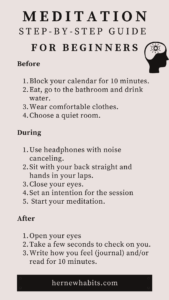
Step-by-step guide on how to do meditation for beginners (at home):
After a few weeks, you will feel comfortable with the concentration technique.
Once that happens, you can move on to more challenging ones.
In my case, my goal is to be able to meditate while walking.
It will be amazing to do it! Don’t you think?
But for now, let’s focus on this simpler technique.
Before your meditation:
- Block your calendar for 10 minutes.
- Eat, go to the bathroom and drink some water.
- Wear comfortable (loose) clothing for the session.
- Choose a quiet room with no interruptions.
- Decide if you want to do guided meditation or not.
- If you decide to do it yourself, pick between the body scan or the breathing method.
During meditation:
- Use headphones if necessary to cancel out noise from outside.
- Sit on the floor or mat with your back straight and your hands in your lap.
- Close your eyes.
- Set an intention for your session (tranquility, be more present, relax…)
- Begin your meditation using the method you picked (breath or body scan).
After meditation:
- Open your eyes
- Take a few seconds to see how you feel.
- Write how you feel (journal) and/or read for 10 minutes.
As I said, this can work as a checklist, so you know step by step what to do when you meditate.
As you can already imagine, meditating can be challenging.
When I was a beginner, I would have liked to know about the obstacles that I will face.
So now, I am going to share with you the challenges that you may encounter when you start to meditate.
Obstacles beginners face when they do meditation at home
You feel like you can’t stop having random thoughts
Many beginners worry too much about this, but it’s completely normal.
During your life, you have trained your mind to be busy all the time.
So, it is normal that it takes you a while to train it to do the opposite.
Every day you meditate, you are practicing to reach that goal.
Your environment is not quite enough
When you’re a beginner, you want to do everything you can to make sure you focus during meditation.
That is why it is so important to find a quiet place in your home.
If that’s too hard, my best advice is to use noise-canceling headphones.
That’s what has worked for me before.
You fall asleep during meditation
Many beginners make the mistake of starting to meditate lying on their bed.
Although it sounds very convenient, it can be a problem if you fall asleep.
Throughout your life, you have trained your brain to think that when your body relaxes, it is time to sleep.
That’s why every time your body relaxes, you feel like sleeping.
I know of only one way to help you with this.
And it is acquiring a proper position when meditating.
By that, I mean sitting on the floor or on a mat with your hands in your lap.
The sooner you start to get used to this position, the better.
Even if you are a beginner, try your best to use this position from the start.
You think it’s too much time
I understand how busy your life can get sometimes.
However, to meditate, you only need 10 minutes.
Think about the time you spend scrolling through social media or watching TV.
It can be 30 minutes or even an hour!
So 10 minutes of your time is not too much.
Also, it provides more benefits to your body than your other daily activities.
How to do meditation for beginners daily?
Meditation like any other activity can become a habit.
When you create habits, it means that your body does things without thinking.
In this case, you are not looking to automate the actual act of meditating.
What you have to do is create the habit of starting to meditate every day.
I know it sounds a bit confusing, but let me explain it.
What you want is to program your body to start meditation every day.
That means your body will automatically prepare for your meditation session.
This process takes some time, but you can do it!
If you are new to habit formation, here are some tips to help you.
4 tips on how to do meditation for beginners on a daily basis:
Make it easier to get started.
Don’t overcomplicate it.
Start with 10 minutes every day.
And don’t schedule your session in the middle of the day.
Try to do it early in the morning or late at night.
That way, you can make sure that no one and nothing interrupts you.
Instead of checking your phone in the morning, try doing a short meditation.
Do it at the same time and in the same room.
Choose a space in your home where you always have a mat ready.
Also, set an alarm for the same time every day.
That way, every time the alarm goes off, you walk to the room you picked and start your meditation.
Reward yourself.
Give yourself a reward every time you finish a session.
Or you can do something special for yourself if you complete a week of meditation.
These rewards will help you maintain the habit of meditation.
Extend older habits.
One of the easiest ways to incorporate a new habit into our routine is by using old habits.
For example, if you work out every morning at the same time.
Schedule your meditation session before your exercise routine.
Another example would be if you work from home and have dinner at the same time.
Set the alarm to do your meditation after you finish eating.
As a beginner in meditation, I know you have questions.
Below, you will see the answers to questions that beginners have about how to do meditation.
Beginners FAQ on how to do meditation:
When I was starting my practice, I had a lot of questions.
Searching the internet and reading books, I found the answer to many of them.
But also through my experience, I managed to solve some.
Below I share the answers to these questions.
How often should a beginner meditate?
I recommend starting every day for 10 minutes.
If that’s hard for you, try a session every other day.
But, the only way to get into the habit and see results faster is to do it every day.
How to get into the habit of meditation?
When you want to create a habit, it helps to understand why you want to do it.
Why do you want to meditate?
Is it because of what everyone else is doing?…
Or is it because you want to reap some of the benefits that meditation brings?
If your reasons for meditating are strong enough, then it’s a good start.
If you want to create a meditation habit as a beginner, it is important that you enjoy the sessions.
You can do it by choosing to do it alone or with a group of people.
Also, you can decide between doing it yourself or using a guided meditation.
How to start meditating before bed?
First, start going to bed at the same time.
This is to create a stable routine at night.
Second, set an alarm before your sleeping time.
That way, you have a signal that reminds you to meditate.
Third, don’t forget your posture.
Even if you’re doing it from bed, try to sit up straight and place your arms on your legs.
Finally, do not forget to do it every day.
What is the best meditation schedule for beginners at home?
This depends on your daily routine.
But meditating first thing in the morning or late at night is best.
Do your best and block only 10 minutes at the beginning of the day or at the end.
Later, when you feel more comfortable, you can increase that time.
Currently, I meditate 20 minutes every day, but I also started with only 10 minutes.
What is the best meditation position for beginners at home?
The best meditation position for beginners is:
Sit on the floor or on a mat with your back straight and your hands in your lap.
Avoid sitting on your bed because that might make you fall asleep.
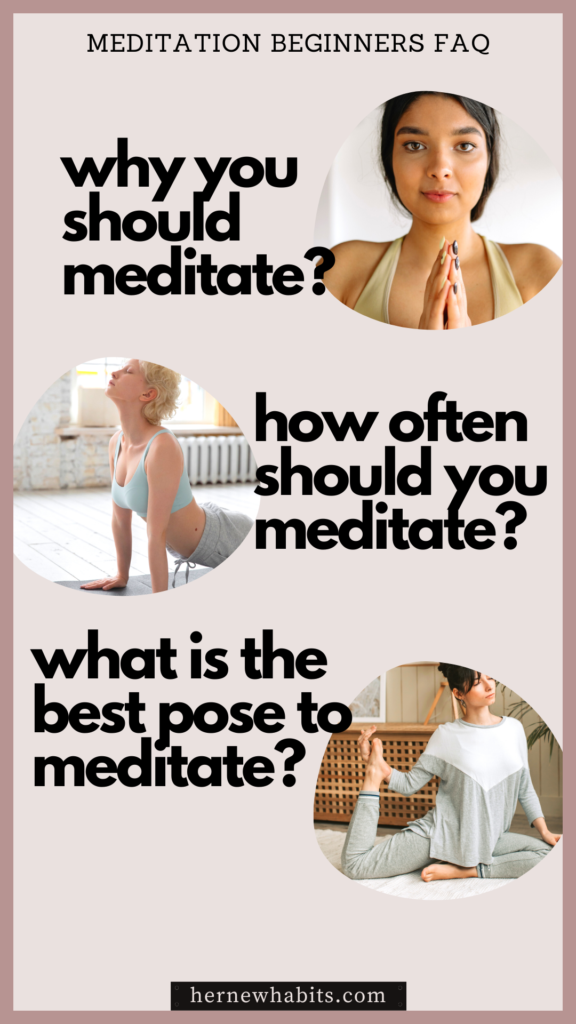
Conclusion
It is important that before meditating you know more about meditation as such.
You must know its benefits and what it does to your body and mind.
That way, you will enjoy each session more.
I showed you the step by step on how to do meditation for beginners at home.
That was the same process I did when I first started meditating.
It will take a while to settle your mind.
But you will be able to do it with practice.
The benefits of meditating are so many that I will never stop.
Making meditation a habit has changed my life, and I hope it will be for you too.
In this post, I also shared some common questions beginners ask about meditation.
And the obstacles you may face during your sessions.
I hope that all this information is enough for you to start meditating for the first time.
Let me know if you have any questions.
Would you be interested in a 30-day challenge meditation for beginners? Let me know in the comments or send me a “Yes” message here
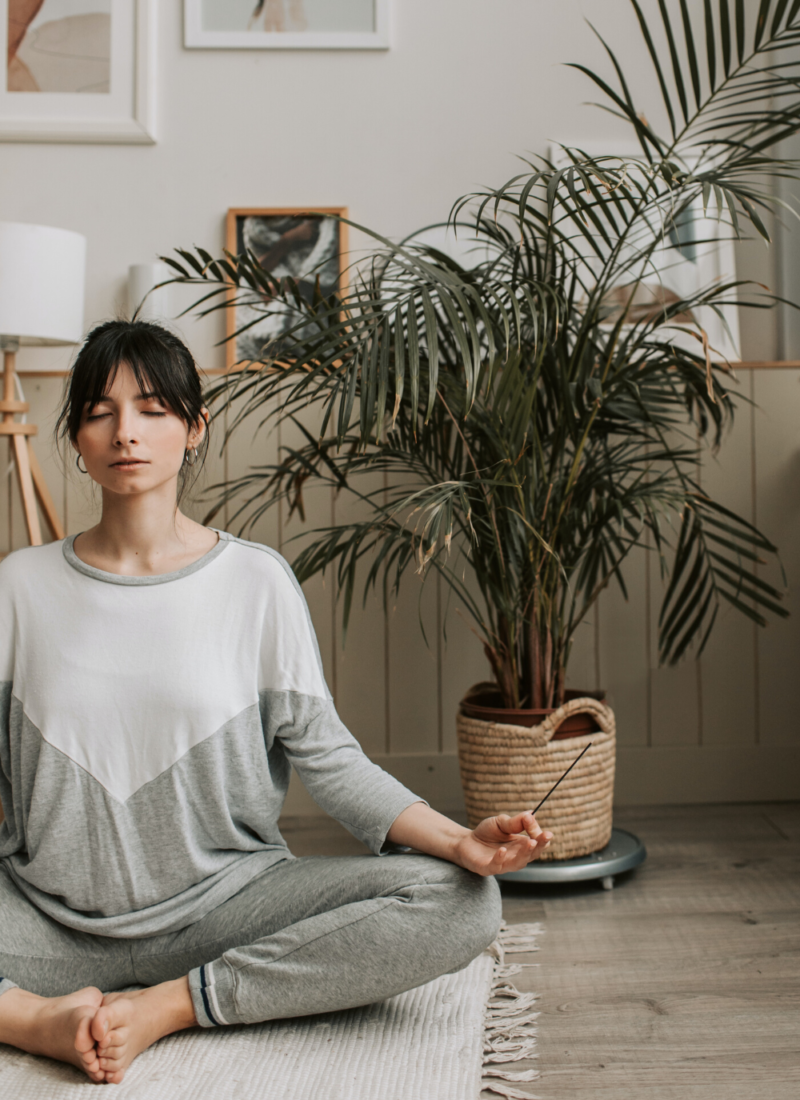
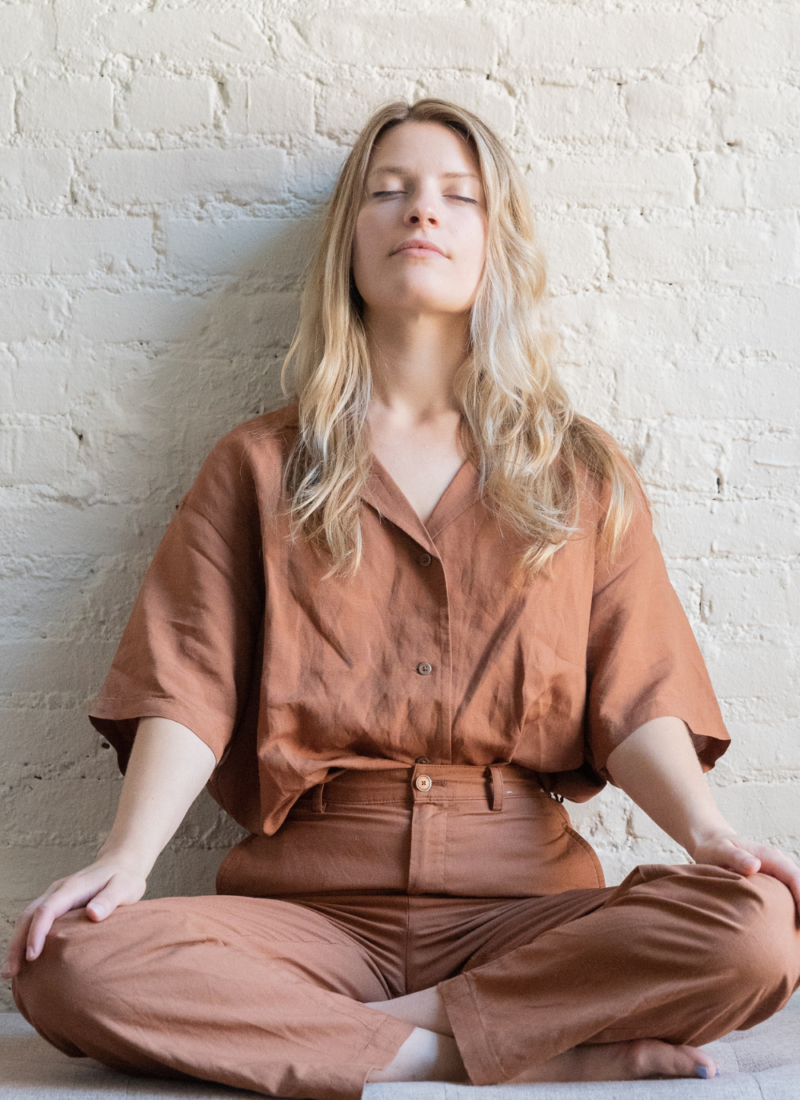
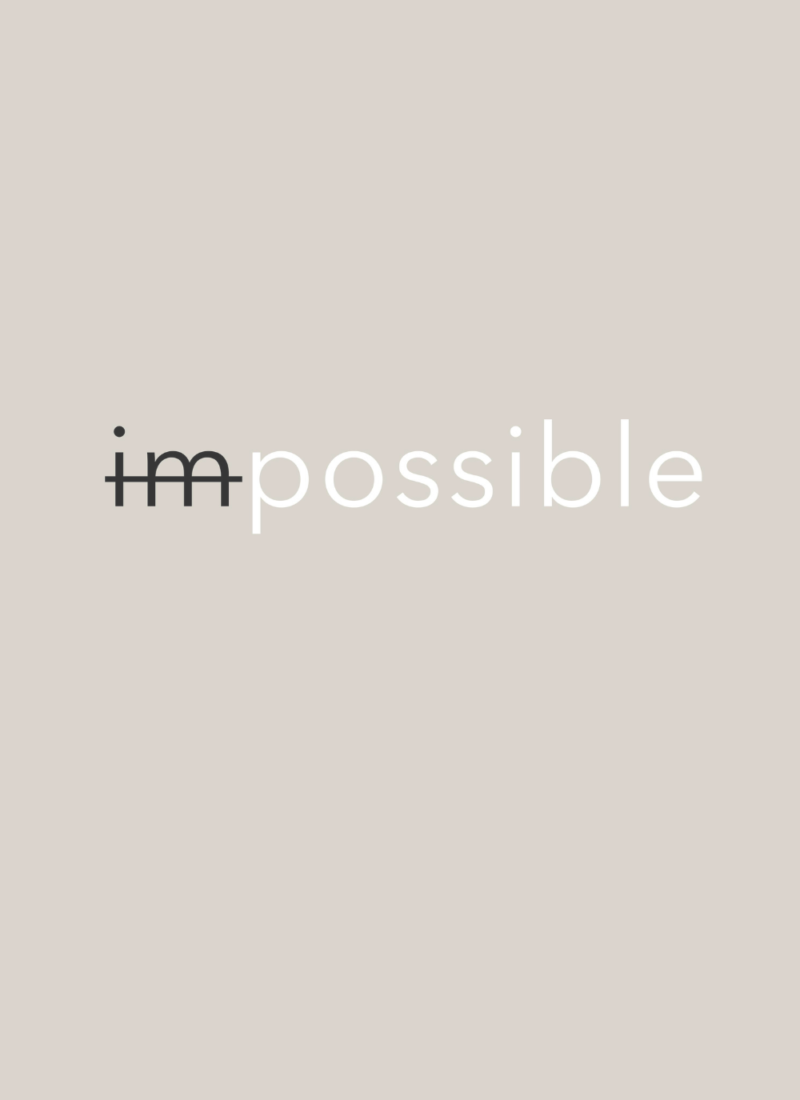

LG says
Every time I see a person meditating, I never see headphones. Thank you for pointing out in your article that noise canceling headphones may be useful in assisting you with establishing quiet in an environment that may not be so quiet (i.e. apartment life, city life).
Nury - Her New Habits says
Oh you’re welcome. It is something that works for me since I live in a very noisy city 🙂
Thrive with Mariya says
I’m still a newbie at meditating. Some days I find it so hard. But your post is so helpful, I’ll definitely try some of the recommended techniques.
Nury - Her New Habits says
Meditation has so many benefits. I’m glad you are getting started with it. It is hard at the beginning, but if you are consistent you should start seeing results after 2 weeks. Use of the tips a share here to make it a habit so it is easier for you to be consistent.
Evon says
Yes, meditation is a great way to collect your thoughts and relax your mind. Thank you for the excellent advice on how to meditate correctly. Excellent post.
Nury - Her New Habits says
Exactly, meditation helps to relax and have peace of mind. Thank you for your comment!
Farukh says
This is such an informative post!
Especially the part highlighting ‘concentration meditation.’
Nury - Her New Habits says
Thank you! Yeah, that’s what beginners should learn to start meditating.
Deanna | Life By Deanna says
This is such a helpful post!! I have always wanted to meditate but ran into so many issues with it like you talked about! I am going to try adding a short meditation to my night time routine since that is the most calm and quiet time of my day 🙂 thanks for this post!
Nury - Her New Habits says
Hi Deanna, I’m glad to know that it was helpful for you. Meditation is a little hard, especially at the beginning, but once you practice and be consistent it will become easier for you. Adding a meditation session to your nighttime routine is a great idea. I hope you can stick to it and enjoy all the benefits that come with it 🙂
Abida says
This was such a helpful article for me. I have been trying to meditate for couple of times but failed always. Thanks for the strategies
Nury - Her New Habits says
I’m happy to know that this was helpful for you! That’s my intention, make it easier for beginners to start and enjoy the benefits of meditation 🙂 Thank you for comment!!
hameesha says
It’s a very nice article for beginners.. Loved all the points and tips you mentioned. Awesome. and thank you. Will try.
Nury - Her New Habits says
Thank you! I’m glad you liked it 🙂 I tried to give as much information as possible and wanted to make sure I answered a lot of questions I had when I was first meditating.
Shelley says
I think your post is very helpful for people who have never tried meditation but others can find value here as well. I use an app for guided meditation at bedtime to help me fall asleep. I have anxiety and insomnia and it really helps me. I also wrote an article on how meditation helps relieve stress. https://sensiblyshelley.com/easily-relieve-stress-with-meditation/
Thank you for sharing!
Nury - Her New Habits says
Yeah, I hope it is a good guide for people who are just starting with meditation. It’s great that meditation is helping you sleep better. They are so many benefits when we are consistent 🙂
Martha says
Such an excellent post for beginners to meditation! I love that you have an FAQ section with helpful tips. It makes meditation sound less overwhelming. I do daily deep breathing, and it’s similar to meditating.
Nury - Her New Habits says
Thank you. I created the FAQ section because when I started I had so many questions and I had to research a lot to answer them. I wanted to make it easier for beginners to understand meditation. Daily deep breathing is a great technique as well.
Mehaa says
This is such an indepth article. I love it. I really like using my airpods for meditation as well.
Nury - Her New Habits says
Thank you! I wanted to provide as much information as I could for beginners in meditation 🙂